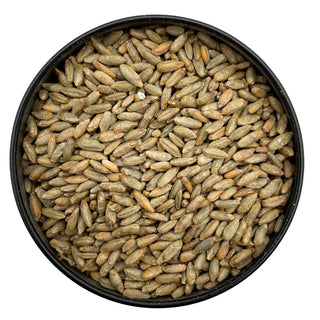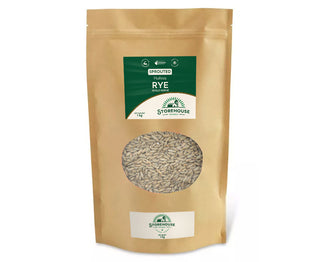Sprouted Hulless Rye
- Unit price
- / per
Sprouted Hulless Rye
Product of Canada
- High in Nutrients and Enzymes: Sprouted hulless rye is a powerhouse of essential nutrients. The sprouting process increases the availability of vitamins such as Vitamin B, Vitamin E, and Vitamin C. Additionally, sprouting rye activates enzymes that make the grain easier to digest and enhance the absorption of these nutrients into the body.
- Rich Source of Fiber: Sprouted hulless rye is exceptionally high in dietary fiber, which is crucial for maintaining a healthy digestive system. The fiber aids in regular bowel movements, helps to prevent constipation, and may contribute to lowering cholesterol levels, thereby supporting heart health.
- Protein Content: This grain is a good source of plant-based protein, making it a valuable dietary component for vegetarians and vegans. The proteins in sprouted hulless rye are easier to digest compared to those in unsprouted grains, due to the breakdown of antinutritional factors during sprouting.
- Low Glycemic Index: Sprouted hulless rye has a lower glycemic index than many other grains, meaning it causes a slower rise in blood sugar levels. This is beneficial for people managing diabetes or looking to maintain stable energy levels throughout the day.
- Antioxidant Properties: The sprouting process increases the antioxidant content in hulless rye, including polyphenols and flavonoids. Antioxidants are important for fighting free radicals in the body, reducing inflammation, and may help in preventing chronic diseases.
For centuries, people wouldn’t eat grains and beans without natural processing like soaking, sprouting and fermenting. Cultures all over the world understood that proper preparation was vital to increase digestibility and nutrient availability. Some cultures passed this wisdom down through generations, while others lost it through industrialization.
Today, sprouting is resurging as more people seek foods prepared in slow and traditional ways. Sprouting offers no shortcuts, so customers trust that they are receiving a wholesome and healthful product.
For many people, unsprouted grains and beans cause digestive discomfort. Sprouting activates starch, protein and lipid degrading enzymes that “pre-digest” seeds. Namely, it converts dense proteins and complex carbs into more digestible amino acids and simple sugars. Despite the starch to sugar conversion, sprouted grains have a very low glycemic index.
All grains also contain nutrient inhibitors to protect valuable nutrients from being utilized until optimal growing conditions are met. Unfortunately, these prevent us from fully absorbing the seed’s nutrients. Sprouting unlocks nutrient inhibitors like phytic acid, depending on the seed and sprouting time. For example, chickpeas sprouted for 48 hours have a 67% decrease in phytic acid. For this reason, sprouted grains, seeds and beans are considered more digestible and bioavailable.
Optimize Baking Performance Increase loaf volume
- Softer and fluffier texture than unsprouted whole grains
- Richer and more complex taste profiles
- No bitterness, resulting in a sweeter flavour
- Low glycemic index
- Need less sugar in recipe
- Longer shelf life (over 1 year for flour)
- Bread stales at a slower rate
Storage
Intact grain can be stored for up to 6 months in a cool dry location, or 1 year in a freezer. Once milled, it can be stored in a cool dry location for 3 months or 6 months in a freezer.
Disclaimer: This information is for educational purposes only. It is not intended to diagnose, treat, cure, or prevent any disease. The information provided is for educational purposes only and not intended as medical advice. Consult your professional health expert for medical advice. This product has been packaged in the same facility as wheat, tree nuts, barley, and other potential allergens.
Sprouted Hulless Rye
- Unit price
- / per
Adding product to your cart
You may also like
Sprouted Hulless Rye
Product of Canada
- High in Nutrients and Enzymes: Sprouted hulless rye is a powerhouse of essential nutrients. The sprouting process increases the availability of vitamins such as Vitamin B, Vitamin E, and Vitamin C. Additionally, sprouting rye activates enzymes that make the grain easier to digest and enhance the absorption of these nutrients into the body.
- Rich Source of Fiber: Sprouted hulless rye is exceptionally high in dietary fiber, which is crucial for maintaining a healthy digestive system. The fiber aids in regular bowel movements, helps to prevent constipation, and may contribute to lowering cholesterol levels, thereby supporting heart health.
- Protein Content: This grain is a good source of plant-based protein, making it a valuable dietary component for vegetarians and vegans. The proteins in sprouted hulless rye are easier to digest compared to those in unsprouted grains, due to the breakdown of antinutritional factors during sprouting.
- Low Glycemic Index: Sprouted hulless rye has a lower glycemic index than many other grains, meaning it causes a slower rise in blood sugar levels. This is beneficial for people managing diabetes or looking to maintain stable energy levels throughout the day.
- Antioxidant Properties: The sprouting process increases the antioxidant content in hulless rye, including polyphenols and flavonoids. Antioxidants are important for fighting free radicals in the body, reducing inflammation, and may help in preventing chronic diseases.
For centuries, people wouldn’t eat grains and beans without natural processing like soaking, sprouting and fermenting. Cultures all over the world understood that proper preparation was vital to increase digestibility and nutrient availability. Some cultures passed this wisdom down through generations, while others lost it through industrialization.
Today, sprouting is resurging as more people seek foods prepared in slow and traditional ways. Sprouting offers no shortcuts, so customers trust that they are receiving a wholesome and healthful product.
For many people, unsprouted grains and beans cause digestive discomfort. Sprouting activates starch, protein and lipid degrading enzymes that “pre-digest” seeds. Namely, it converts dense proteins and complex carbs into more digestible amino acids and simple sugars. Despite the starch to sugar conversion, sprouted grains have a very low glycemic index.
All grains also contain nutrient inhibitors to protect valuable nutrients from being utilized until optimal growing conditions are met. Unfortunately, these prevent us from fully absorbing the seed’s nutrients. Sprouting unlocks nutrient inhibitors like phytic acid, depending on the seed and sprouting time. For example, chickpeas sprouted for 48 hours have a 67% decrease in phytic acid. For this reason, sprouted grains, seeds and beans are considered more digestible and bioavailable.
Optimize Baking Performance Increase loaf volume
- Softer and fluffier texture than unsprouted whole grains
- Richer and more complex taste profiles
- No bitterness, resulting in a sweeter flavour
- Low glycemic index
- Need less sugar in recipe
- Longer shelf life (over 1 year for flour)
- Bread stales at a slower rate
Storage
Intact grain can be stored for up to 6 months in a cool dry location, or 1 year in a freezer. Once milled, it can be stored in a cool dry location for 3 months or 6 months in a freezer.
Disclaimer: This information is for educational purposes only. It is not intended to diagnose, treat, cure, or prevent any disease. The information provided is for educational purposes only and not intended as medical advice. Consult your professional health expert for medical advice. This product has been packaged in the same facility as wheat, tree nuts, barley, and other potential allergens.







